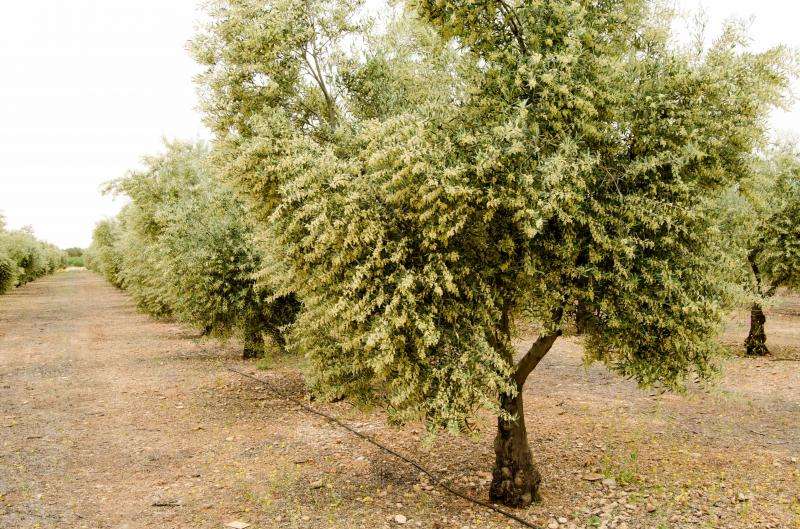Healthier and more sustainable olive oil

A team of researchers that includes UPM have confirmed that the benefits of virgin olive oil are partly due to minority compounds that can be increased with sustainable irrigation strategies.
Researchers have carried out an experimental study for irrigation of an olive grove in order to verify the effects on water stress on both the quantity and quality of the resulting oil. After two years of research, they have proved that the usage of regulated deficit irrigation does not affect the quantity of production, but does cause an increase of phytoprostanes in the oil, which are beneficial contributors to health. Therefore, it may be a good practice for the irrigation of olive groves as it is more sustainable for the environment.
Olive oil is one of the main components of the Mediterranean and Spanish diets. Recent studies suggest links between various olive oil components and their beneficial effects on health. In this sense, it is important to highlight that this functional food has high levels of monounsaturated acids such as oleic acid, which has beneficial effects on cardiovascular and liver health. Additionally, olive oil has multiple minor components such as polyphenols that have a high biological activity.
Phytoprostanes are also present in olive oil; these are not only excellent biomarkers of oxidative degradation products of plants, but are also considered biologically active molecules as they are components of an archaic signaling system to protect plants against oxidative damage. These components are found in free and esterified plants. However, due to lack of sufficient enzymes for hydrolyzing esters, only those found in their free form are absorbed by the body. Although little is still known about its biological effects, there is evidence that phytoprostanes can modulate the function of the vascular system and immune system.
Despite the fact that olive crops are traditionally developed in dry conditions, it has been proved that irrigation is an essential practice to improve olive oil production and productivity. However, in recent years, there have been other problems apart from arid climate conditions and persistent water shortages, such as the strong competition with other non-agricultural users. Thus, in order to address this water scarcity, sustainable irrigation has to combine a production increase with minimal water usage.
Thus, a group of researchers from UPM, CEBAS-CSIC, IBMM and from the Centro Agrario El Chaparrillo experimented with regulated deficit irrigation (RDI), consisting of restricting irrigation during the phases in which water stress has no impact on production.
This research was carried out in an olive grove of the Cornicabra variety with an area of 7x5 m in Ciudad Real. Over two years, 2012 and 2013, researchers conducted a control treatment, watering to avoid water stress and three RDI treatments. As a result of these last treatments, diverse levels of water stress were triggered during the phase of pit hardening.
It was observed that although water stress does not affect production quantity, it does affect quality, thanks to an increase of phytoprostanes, which are beneficial for health. Researchers have found that the level of phytoprostanes changes every year, possibly due to environmental conditions or to tree loads. This may be a topic for future research.
Regulated deficit irrigation (RDI) is therefore recommended as a practice for irrigation of olive groves to achieve healthier food, while also increasing sustainability.
More information: "Water Deficit during Pit Hardening Enhances Phytoprostanes Content, a Plant Biomarker of Oxidative Stress, in Extra Virgin Olive Oil". Journal of Agricultural and Food Chemistry 63 (14): 3784-3792. DOI: 10.1021/acs.jafc.51300805
Journal information: Journal of Agricultural and Food Chemistry
Provided by Universidad Politécnica de Madrid




















